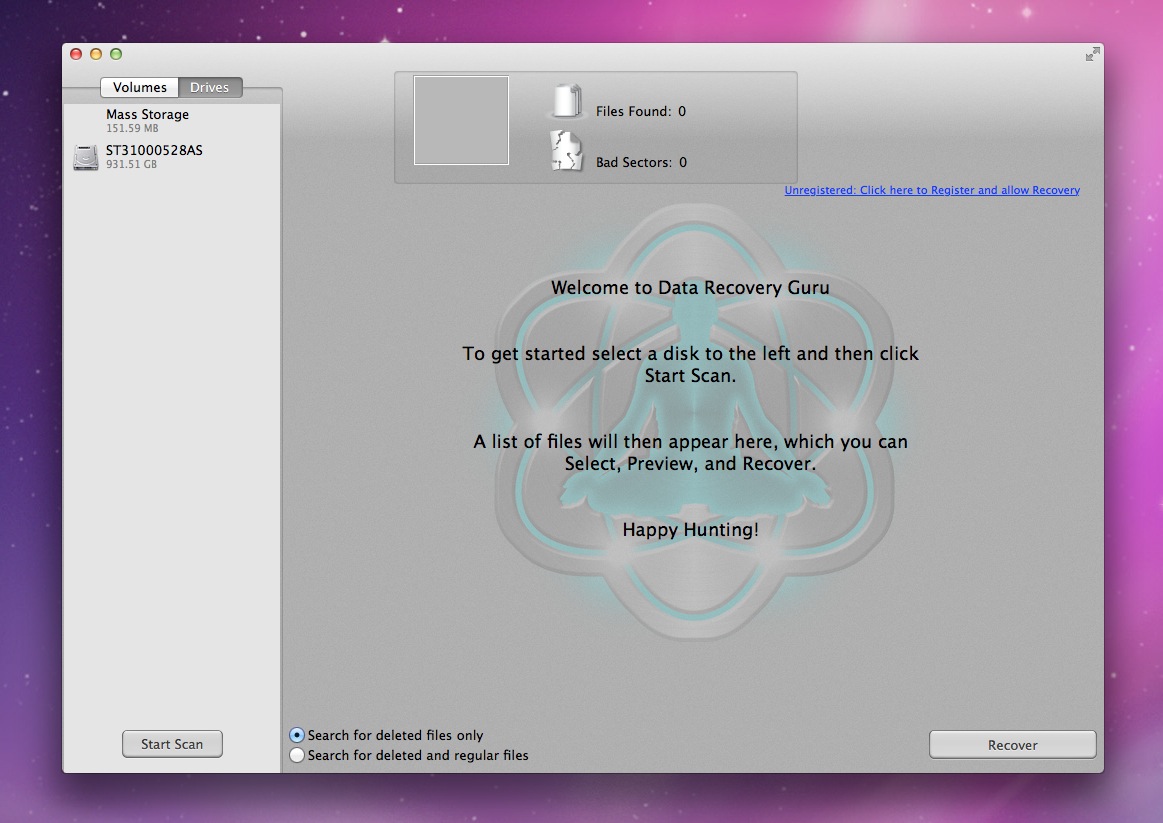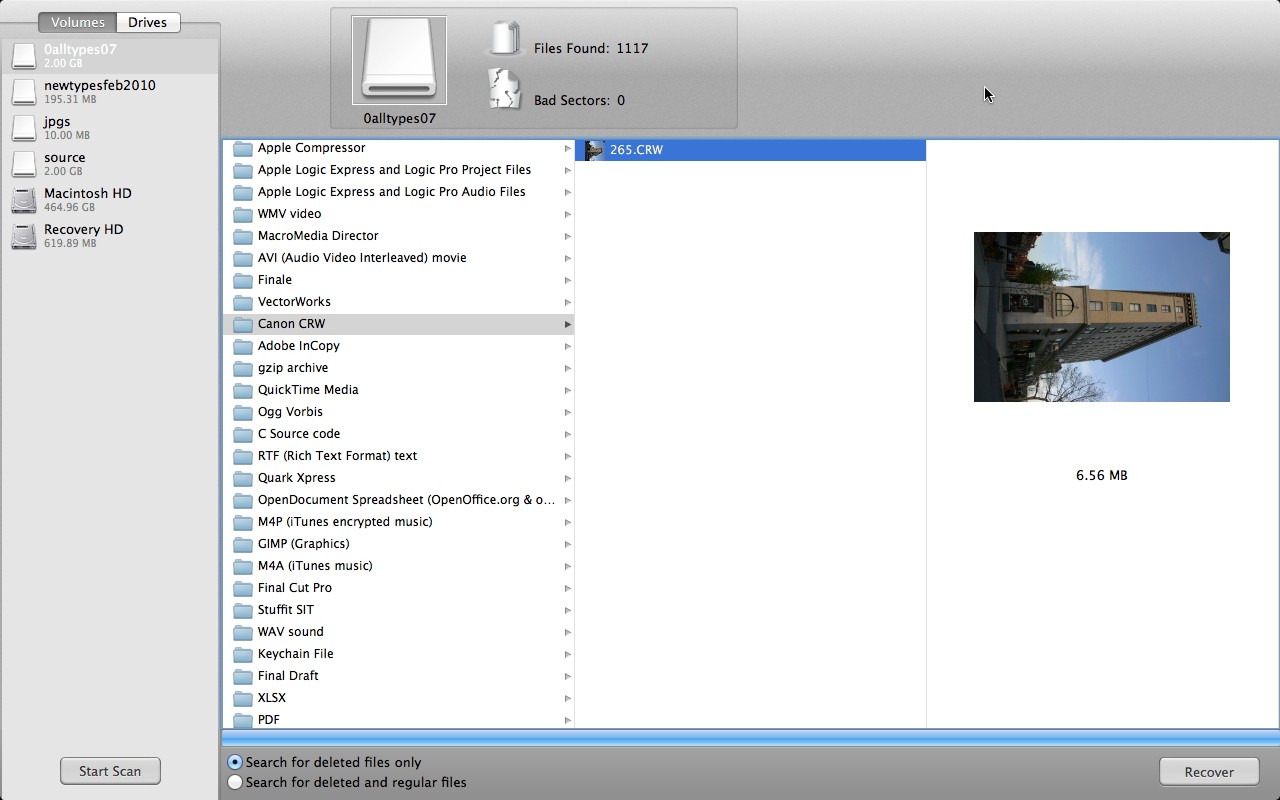Mac Deleted File Recovery Software
We would not state that if we could not back it up, but we can – instantly and risk free. Download the Free Demo to be able to quickly see it in action for yourself. This shows you previews of your deleted files, allowing you to see what data can be recovered.
Mac Data Recovery Guru works by employing content-based file scanning. This is a different approach to traditional forms of data recovery which attempt to repair the device in question, which when they go wrong will write over the data you were trying to retrieve in the first place. Our method opens the device in read-only mode, and will search through the entire device for files, or pieces of files, that are present. It reassembles the data it finds into regular files on the fly. Sound complicated? It is, but after years of refinement it appears to the user as a seamless process, and is as easy as browsing through your regular files in the Finder. In fact, it looks almost the same:
Frequently Asked Questions:
The short answer is any device which acts as a drive on your Mac. However the device does not have to be visible in the Finder as the Recovery Guru line can see and scan devices which OS X does not show. To see if your device is usable, open the program and click on the “Drives” tab on the main window. It will show you everything that can be seen.
The long answer is that it works on devices such as these (this is not an exhaustive list, but a series of examples):
- Disks: Macintosh disks (HFS filesystems, HFS+, HFSX filesystems), Windows disks (NTFS, FAT filesystems), Linux disks (Ext2, Ext3, Ext4 filesystems), Unix disks (XFS, UFS filesystems).
- Digital Cameras: (Kodak, Minolta, Nikon, Canon, Fuji, Olympus, Sigma).
- Mobile Phones: Android, Nokia, Motorola, Palm, Dell, Hewlett-Packard, Samsung, Sanyo, Siemens, Sony Ericsson, Panasonic, Kyocera, Blackberry.
- Miscellaneous devices: USB pen drives / USB flash storage / USB memory sticks, Memory Cards for cameras and portable devices, CD’s/DVD’s, MP3 Players, PlayStations, X-Boxes, Wii’s, Palm devices.
Mac Data Recovery Guru can often still see it and recover deleted files back from it, even in some severe cases. Click on the “Devices” tab next to “Volumes” to see every device that is available. Download the free demo and see.
It makes no difference if the device has been completely formatted 100 times or still has a filesystem. Our programs will search through the entire device irrespectively and pick up any data remnants, which formatting a drive does not affect.
The only things that can typically deter it are the following:
One is if the file you want back has been written over since you deleted it (but your chances are usually pretty good, if you run the demo you will see many files that you deleted years ago).
Two is if the device has been secure-erased, in which case nothing can get it back, with the exception of some data on some SSD drives.
Lastly, Apple’s more recent line of hardware has been shipping with built in SSD drives which support TRIM, which is a mechanism whereby an SSD drive will write 0’s over data as soon as a file is erased. This can greatly decrease the chances of a file recovery in the case of a simple deleted file recovery. However, if you are recovering files from a corrupted disk or volume, then the file recovery will work just as well as if you were recovering from a spinning magnetic drive. This is because the data is not secure-erased unlike with a case of a simple deleted file recovery. If this is what you are running then your best hope is to select “Search for deleted and regular files” in the program and hope that your file will be found somewhere else, such as in a cache somewhere or embedded in another file.
Yes, the recovery of the data will be just the same as if recovering from any other media in this case. This is because TRIM is not enabled for any 3rd party devices, and is not supported by USB memory sticks / memory keys / flash memory etc. So the data recovery will perform normally and generally successfully in this cases.
Download the free trial. It will allow you to preview all of your recoverable files. If you see what you are after, then you can purchase it and the license file will be immediately sent to you which will register your copy and allow you to recover everything you see.
The drive does not need to be visible in the Finder for it to be recoverable with our programs, and drives will often be recoverable even when they are not visible at all. If you run the free trial and see if your drive is present under the “Drives” tab of the main window (if it’s not already under the “Volumes” tab) it will show you if your device is visible to the operating system or not.
In order to search for deleted files, each byte of free space on a disk has to be read. The number of filetypes being searched for and displayed does not effect the speed of the process. The speed is dependent on how fast the disk can be read.
Filenames are not stored as part of the file, they are stored in a complex part of the filesystem. After a file is deleted the Recovery Guru product searches for the content of the file itself, which is the most reliable method of recovering any file or remnant of the file that exists. It is not generally feasible to search for the filename of a deleted file, because that is stored in the HFS Filesystem at the beginning of the disk. To compensate for this the Recovery Guru product shows live file previews that you can browse through, allowing rapid identification of the desired files to be recovered. Additionally, it is fast to recover an entire folder of filetypes to the Finder, and then search through those files using Spotlight. And finally, some filetypes do preserve the filenames because they are stored within the files themselves. Most music files (MP3’s, AAC’s, etc) are like this. They also preserve album artwork within the file. Just import the files into an MP3 player to be able to see this information.
Mac OS X 10.6 “Snow Leopard” or greater.
There is often more data that can be recovered than can be shown in a simple list. For example: Mac Data Recovery Guru will find all text on a device, no matter where it is located (be it in a Word document, in an email, or a web page). It will also find files embedded inside of other files (for example, it will find JPEG’s embedded in PDF’s, or Photoshop files embedded in Illustrator files). Therefore you will often find a lot more data being undeleted off of your drive than is determined by filetypes.)
From PCAdvisor
“The software’s new simplified interface lets users browse their deleted files, and recover them by file type. It’s all very intuitive and simple to use.”
4 out of 5 stars


